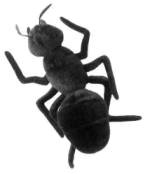
|
   
|
|
Event sponsored by:
|
||||
|


The behavior of social insects in general, and of ant colonies in
particular, has long since fascinated both the scientist and the
layman. Researchers in ethology and animal behavior have proposed many
models to explain interesting aspects of social insect behavior such
as self-organization and shape-formation. Recently, ant algorithms have been proposed as a
novel computational model that replaces the traditional emphasis on
control, preprogramming, and centralization with designs featuring
autonomy, emergence, and distributed functioning. These designs are
proving flexible and robust, they are able to adapt quickly to
changing environments and they continue functioning when individual
elements fail.
A particularly successful research direction in ant algorithms,
known as ant colony
optimization (ACO), is dedicated to their application to
discrete optimization problems. Ant colony optimization has
been applied successfully to a large number of difficult combinatorial
problems such as the traveling salesman problem, the quadratic
assignment problem, scheduling problems as well as to routing in
telecommunication networks.
ANTS 2002 is the third edition of the only event
entirely devoted to ant algorithms and to ant colony
optimization. Also of great interest to the workshop are
models of ant colony behavior which could stimulate new algorithmic
approaches.
The workshop will give researchers in both real ant behavior and in
ant colony optimization an opportunity to meet, to present
their latest research, and to discuss current developments and
applications.
The three-day workshop will be held in Brussels, Belgium, September
12-14, 2002. In the late afternoon of September 11th there will be
also a tutorial on ant algorithms.
ANTS 2002 solicites contributions dealing with any aspect of ant algorithms and ant colony optimization. Typical, but not exclusive topics of interest are:
Conference proceedings will be published by Springer-Verlag in the Lecture Notes on
Computer Science series and distributed to the participants at the
conference site.
Submitted papers must be between 8 and 12 pages long, and must
conform to the
LNCS style.
Submitted papers should be either in Postscript or Adobe PDF format
and should be emailed to:
ants-submissions@iridia.ulb.ac.be.
Each submitted paper will be peer reviewed by at least two referees.
A best paper award will be presented at the workshop.
All accepted papers will be presented at the workshop as oral
presentations or as posters.
By submitting a camera-ready paper, the authors agree that at least one author
will attend and present their paper at the workshop.
A registration fee of 200 EUR will cover organization expenses,
workshop proceedings, the possibility to attend a tutorial on ant
algorithms in the late afternoon of September 11, coffee breaks, and a
workshop social dinner on Friday 13 evening.
Up-to-date information about the workshop will be available at the ANTS 2002 web
site.
For information about local arrangements, registration forms, etc.,
please refer to the above mentioned web site, or contact the local
organizers at the address below.
The number of participants will be limited. If you intend to
participate please fill in the INTENTION FORM and email it to:
ants-registration@iridia.ulb.ac.be.
Only researchers that have received a confirmation to their intention
form may take part in the workshop.
PROGRAM CHAIR Marco DORIGO, Ph.D. IRIDIA, ULB, Belgium (mdorigo@ulb.ac.be) FNRS Senior researcher Tel +32-2-6503169 IRIDIA CP 194/6 Fax +32-2-6502715 Universite' Libre de Bruxelles Secretary +32-2-6502729 Avenue Franklin Roosevelt 50 http://iridia.ulb.ac.be/~mdorigo/ 1050 Bruxelles http://iridia.ulb.ac.be/~ants/ants2002/ Belgium http://iridia.ulb.ac.be/dorigo/ACO/ACO.html
Gianni DI CARO,
IRIDIA, ULB, Belgium
(gdicaro@ulb.ac.be)
Christian BLUM,
IRIDIA, ULB, Belgium
(cblum@ulb.ac.be)
Payman ARABSHAHI, JPL, NASA, Pasadena, CA, USA
IRIDIA, Dorigo's lab, is at the 5th floor of the same
building. There will be signs giving directions to the workshop rooms.
|
Last updated Jan 11, 2002